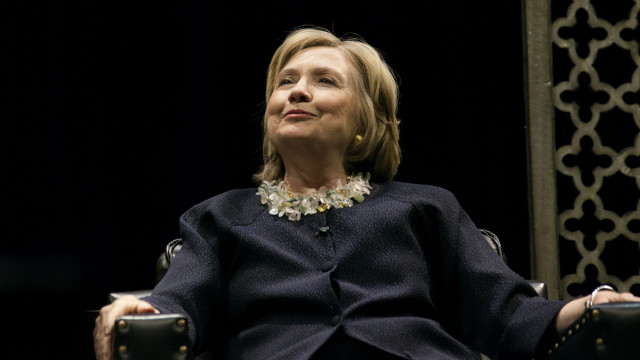This post originally appeared at The Nation.

Hillary Clinton talks at the Unique Lives and Experiences series, Broomfield, CO. (Rex Features via AP Images)
President Obama made what almost sounded like a pitch for Hillary Clinton’s gun-control stance at his passionate Friday press conference (even as he gently chided his former secretary of state for backing a Syrian no-fly zone). A visibly angry Obama promised to “politicize” the issue, and then he offered advice to gun-control forces:
The people who are troubled by this have to be as intense and as organized and as adamant about this issue as folks on the other side.… here’s what you need to do: you have to make sure that anybody who you are voting for is on the right side of this issue. And if they’re not, if they’re great on other stuff, for a couple of election cycles, you’ve got to vote against them. And let them know precisely why you’re voting against them. And you just have to, for a while, be a single-issue voter, cause that’s what is happening on the other side.
If Democrats listen to Obama, that could be bad news for Bernie Sanders. Clinton has announced an ambitious new push for gun limits, in the wake of the massacre at Umpqua Community College in Roseburg, Oregon, Thursday, and she’s hoping it changes the momentum in the unexpectedly close Democratic primary.
Gun control is one issue where Clinton stands to Sanders’s left. The Vermont socialist isn’t terrible on guns: Though the NRA endorsed him in his first race for Congress, he has a D-minus rating from the group. He supported the 2013 background-check bill, in the wake of the Sandy Hook massacre, and closing the gun-show sales loophole.
Yet Sanders has troubled gun-control advocates with a few vexing apostasies, most notably his vote against the Brady Bill. On that and other gun issues, he has said that he believes states and not the federal government should set limits. He also voted for NRA-backed bills granting gun manufacturers legal immunity against claims by gun victims, and making it possible to carry checked guns on Amtrak. He told Bill Maher last year that mental health was “maybe the more important issue” in stopping mass shootings than gun control. “We’ve got millions of folks walking the streets who are need of mental health and they can’t walk into a place and get it,” he said. “This is the NRA talking point.… that’s what they say.” Maher replied.
Sanders’s mixed stand on guns reflects his political reality: He’s the senator from a pro-gun state that suffers little gun violence. In fact, he touts his record appealing to gun owners as giving him the kind of broad populist appeal that might, in the general election, help Democrats in red states and rural areas, where party leaders are often seen as gun-grabbing elitists.
Yet it could hurt him in Democratic primaries. Clearly, after a summer spent losing ground to Sanders on her left, Clinton has begun an offensive on a crucial issue that could have Sanders playing defense. In a season marked by shocking multiple gun-killings from Charleston, South Carolina, to Roanoke, Virginia, to Roseburg, Oregon, the former New York senator has raised the issue of gun control with steadily rising fervor.
“The stakes are too high, the costs are too dear, and I am not and will not be afraid to keep fighting for common sense reforms and along with you, achieve those on behalf of all who have been lost because of this senseless gun violence in this country,” she said after the murder of the Mother Emanuel Nine by white-supremacist Dylann Roof. “We’ve got to do something about gun violence in America, and I will take it on,” she declared after Vester Flanagan murdered two former coworkers on air in Roanoke.
After the murder of nine people at the Umpqua Community College in Roseburg, Oregon, Thursday, Clinton promised to lead a “national movement” that would counter the NRA. “Here’s what the other side counts on,” she said. “They count on really having an intense, dedicated group that scare politicians and say, ‘We will vote against you.’”
And in New Hampshire Monday, Clinton unveiled a four-point plan to tighten gun restrictions. She promised to pursue executive action to close the gun-show sales loophole if legislation doesn’t pass early in her first term. She wants to close the “Charleston loophole” in the current background-check process that lets a gun sale proceed if the background check is not finished within three days — the loophole that let Roof, a convicted drug felon, buy his guns. She’ll back legislation that prohibits domestic abusers from buying and possessing firearms.
And going right at Sanders, she wants to repeal the legal immunity enjoyed by gun manufacturers thanks to a controversial 2005 NRA-backed immunity law. Back then New York Senator Hillary Clinton voted against the law; Vermont Congressman Bernie Sanders voted for it.
Is Clinton’s gun-play against Sanders fair? And will it work?
Of course it’s fair. So far, she hasn’t even mentioned her primary rival by name in her gun-control remarks. While we’re on the subject of “fair,” it should be noted that Clinton and Sanders are not the only Democratic candidates. Former Maryland governor Martin O’ Malley is very good on this issue; he supports reinstating the assault-weapons ban, which Clinton’s plan released Monday, strangely, does not include. But though O’Malley has climbed from 1 to 4 percent in Iowa, he remains a serious longshot.
Former Virginia senator Jim Webb is running to the right of Clinton — Bill Clinton, that is — on everything from guns to race. Former Rhode Island senator Lincoln Chafee has said nothing about gun control in the wake of recent attacks, just as he has said almost nothing about anything since he declared his candidacy. And yes, Lawrence Lessig has joined the Democratic field, but though he supports tougher gun limits right now, he’s making money in politics his single issue, and party leaders are resisting his request to join debates.
So yes, Clinton’s gun-control offensive is fair. We’ll have to see whether it works. So far, Sanders hasn’t shifted his stance on guns in the wake of recent killings. His remarks on Charleston admirably referenced race, but didn’t mention guns. When Chris Hayes asked him last week whether the US should be looking at the kind of limits imposed by other countries, Sanders shot back:
You got a whole lot of states in this country where people want virtually no gun control at all. And we have to start talking to each other…. Stop the shouting and let’s work together to do something that’s realistic.
But Sanders’s open-minded approach to guns doesn’t always reckon with the way the issue has been polarized — not by Democrats but by the NRA and the far right. Mostly, it’s been the NRA and its allies doing the shouting. Once an organization devoted to promoting safe, responsible gun ownership, the NRA has become a gun-manufacturers’ lobby that plays into some of the darkest, most antigovernment forces in American politics.
Sanders’s insistence that “talking to each other” is the answer ignores a troubling political reality: The vast majority of Americans, including a majority of gun owners, support a roster of sensible gun restrictions, but progress is blocked by right-wing gun groups, the Republican Party they control, and a handful of Democrats in red states in thrall to the gun lobby.
Sanders’s capacity to thread the needle on gun control, as a socialist representing a gun-loving state, shows a political savvy that his skeptics and caricaturists don’t sufficiently appreciate. But now he’s running for president, not Vermont senator, and in a Democratic primary where voters are fed up with gun massacres. Savvy, as well as principle, might require a new approach. Or else Clinton might reverse his stunning primary gains, by showing new courage and leadership on one of the country’s toughest and most important issues.


